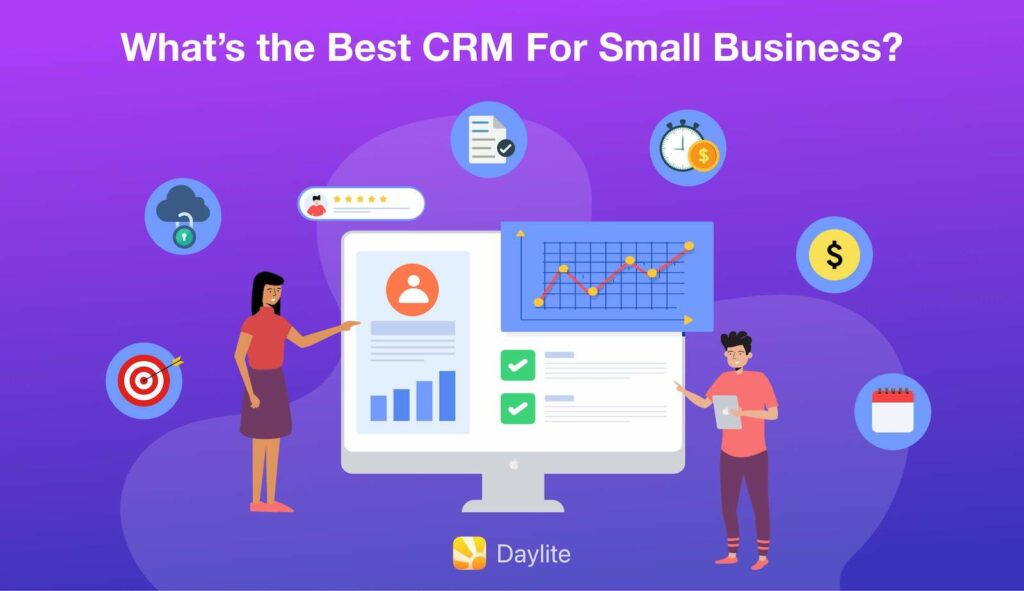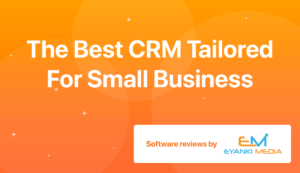The CRM (Customer Relationship Manager) for the small business you choose will become a critical tool for your company as you work on building relationships with your clients. Finding the right software can feel overwhelming, so this blog walks you through everything to consider when choosing the best CRM for your small business.
Ready to win more clients and get more done?
If so, join us as we explore why CRM is important for small businesses and showcase why Daylite is the ideal business app for you.

Why Does a Small Business Need CRM?
Like any inquisitive entrepreneur, you are probably asking yourself questions like “How does a CRM help business to grow?” The bottom line is that there are many ways in which a great CRM platform can fuel the expansion of your company.
First and foremost, CRM enables small businesses to keep track of interactions with clients, manage follow-ups, and track deals – all to help strengthen relationships and increase revenue. By acting as a central location to organize all the moving pieces about clients, leads, and your team, CRM can help prevent details from falling through the cracks.
If you feel like you’re wearing multiple hats and still losing control of your business, a CRM for small business can be especially helpful if you have plenty to do with fewer resources. The leading platforms include a variety of CRM tools for small businesses, like contact management capabilities, communication functionalities, and more.
Small businesses can leverage CRM to improve productivity and team efficiency, increase sales, client relationships, organization, and growth. Using CRM software can be the driver behind taking your small business to the next level.
Many small businesses struggle with:
- Staying on top of follow-ups
- Managing an increasing client list without hiring more staff
- Keeping track of important details about clients and projects
- Creating a sales process that the team follows consistently
- Maintaining client visibility
- Following up in a timely, efficient manner
If the list above sounds like you, then it’s time to start seriously thinking about implementing a CRM solution for small businesses.
A small business CRM system not only helps you store client and lead information, but it also lets you identify prospects, stay on top of follow-ups, and track interactions in one central location. Whether you’re a business of 1 or 100 people, when you properly implement a CRM, anyone can see when a client was last spoken to, what they asked, when they were last in touch, and anything else you may need to know if customer-centricity is a priority of your business.
With a CRM for small business, you can:
- Manage a growing list of clients without having to hire more people
- Keep track of all the important details about your clients in one place
- Create and automate follow-up processes for clients and leads
- Keep a history of every interaction, deal, project, task, email, or call with clients
- Create a streamlined sales process everyone can follow
When considering a CRM for your small business, before thinking about the features you’re looking for, there are several other factors to take into account before making your decision.
Things to Consider When Choosing the Best CRM for Small Business
If you want to tap into all of the benefits of CRM for small businesses, you must consider factors such as:
Future growth: As your small business grows and adapts to changes, so should your CRM for small business! Make sure you choose a CRM system that is flexible enough to grow alongside your business over time. Does the CRM offer you features, functionality, and pricing that will work with your business as you grow?
Flexibility: No small business is the same, so it’s important to evaluate the flexibility of a CRM. Does the CRM you’re evaluating have the ability to customize your own workflow or steps? Does it have the ability to edit custom fields to fit your business and language? When you’re ready to invest in a CRM, make it a priority to look for options that let you customize features and functionality to align with the needs of your small business.
Small-business-centric: Many CRM tools claim to work for a range of small to large businesses. While it’s important for CRM to be flexible enough to grow alongside your business, CRMs that claim to work for small to enterprise companies tend to have features and workflows that are ideal for large enterprises but don’t work for small businesses that are more flexible or agile, and results in longer learning curve or worse paying for features that you don’t need Do you want a CRM that is tailored to the needs of small businesses? Is there enough flexibility to adapt as your business processes quickly change and improve without hurdles in your way?
Time to implement: Any CRM tool you go with will take some time to implement and adopt , but a steep learning curve that makes it difficult for your team to make part of their workflow could make things less efficient. When evaluating small business CRMs, think about how much time you’re willing to invest. Does the CRM vendor offer simple training tutorials that you and your team can use to get started? Or do they require an expensive onboarding package or training?
Small Business CRM Features
Every small business is unique, and while many CRM tools offer similar features, not every CRM will be a one-size-fits-all solution. Some CRM software focuses on sales, others on marketing, and some are even industry-specific. Others encompass various departments and are built around collaboration and operational efficiency. It’s important to balance the most in-demand features of any small business CRM while also considering the specific needs that will help you and your business.
When evaluating CRM software for small businesses, here are some features you need to look for:
In-Demand Features:
- Contact management: Keep track of contact details such as name, email, address, or any other kind of information you can collect about your clients.
- Email integration: Integrate email so you can keep track of email correspondence history with leads and clients.
- Interaction tracking: Track client interactions, like conversations by phone, email, meetings or any other channels to keep an ongoing history.
- Project management: Track projects and tasks for your team surrounding client projects as well as internal projects.
- Reporting and analytics: Report on sales, leads, and other data you collect in your CRM. Consider the capability for custom reporting if you have very specific analytics needs.
- Sales management: Track leads from initial meeting to closed deal.
- Pipeline management: Track deals through various stages of the sales pipeline. This streamlines each deal for a visual, consistent, easy to follow customer experience.
- Tasks management: Track to-dos with deadlines, set reminders for tasks, and prioritize to-dos.
- Integration: Connect your small business CRM to other tools or apps you use to share information or automate processes.
- Mobile access: Capture, edit, and update client info from your mobile device on-the-go.
What to Look for in a Small Business CRM Vendor
Just as important as your CRM tool itself is the customer service and support you will get from your CRM for small business vendors.
Pairing the best CRM for small businesses with a client-oriented vendor can be a true game-changer for your company. With that in mind, make sure to do your research. Ask yourself the following questions:
- Does the CRM vendor have a good track record with customer service?
- What do their online reviews and ratings look like?
- What kind of support do they offer and when?
- How long has this company been in business? Many new companies may seem enticing or affordable, but can you depend on getting the service you need for the life of your business?
- Do they provide free training, self-training tutorials, or paid training packages with business specialists?
You should also look for the opportunity to test out the CRM with a free trial or demo so you can assess if you’ve chosen the right small business CRM system. Most importantly, never forget that you can also rely on your peers to tell you the truth. Websites like Capterra, G2.com, and smallbizcrm offer reviews and ratings from verified users, best-of lists, and awards for high-performing software, all based on what real customers are saying. What are the pros and cons? Are these reviewers facing the same problems you are?
Daylite CRM Business App for Apple-based Small Business
Most CRMs focus solely on clients and sales without helping you manage projects and tasks. Daylite is a Mac CRM that does both – helping you organize all the different steps, people, decisions, emails and tiny details of each project in one place.
Daylite is made to help small businesses reduce the time it takes to manage clients, sales and projects. An app built exclusively for your Mac, iPhone and iPad, that will help manage your business efficiently so you have more freedom to do what you love.
Daylite is ideal for small businesses in professional services such as consultants, lawyers, real estate agents and brokers, financial advisors, marketing agencies, photographers, and videographers. Daylite also benefits small businesses with a long sales cycle that keep track of leads in various stages, such as manufacturers or wholesalers.
If you’re a small business that uses Macs, iPhones, and iPads and you’re looking for a more organized way to manage your clients and projects, Daylite could be the small business CRM for you!
Who Daylite IS NOT For:
- Retail businesses
- eCommerce businesses
- Mid to large-sized business (100+ employees)
- Businesses not on Macs (Daylite is not for PC/Windows)
Who Daylite IS for:
- Businesses on Macs, iPhones, and iPads
- Solopreneurs
- Small Business (1-100 users)
- Sales Teams
- Project & Production Teams
- Professional Services Businesses
- Wholesales Businesses
What Daylite can help you with:
- Remembering to follow up with clients with a systematic way of staying in touch
- Tracking projects & to-dos
- Streamlining project management and processes with checklists and stages
- Ramping up business and increasing your client list without having to hire more people
- Keeping track of and remembering important details about clients and client projects
- Systematizing and automating a sales process
- Remembering all the conversations you had with clients, leads, and vendors
Why Daylite?
Keeping track of follow-ups and projects can be challenging for a small business. When you’re wearing many hats, juggling all the details is stressful. While many CRMs help you manage clients and leads, they don’t help you manage the moving pieces of client projects and to-dos.
Daylite helps you regain control of your business, so you can spend less time doing tedious tasks and more of it focused on doing what you love. Daylite is designed for small businesses that need to track the full lifecycle of a client, from the initial meeting to a closed deal and through a finished project – including following up for repeat business. Daylite helps small businesses work more efficiently so you can close more deals and get more done without hiring more people.
Are you ready to transform your business and clients’ experience with the leading CRM for small businesses? If so, we invite you to connect with our team or book your free demo. Once you experience Daylite, you will never want to manage your business without it. Try Daylite free for 14 days.
About the author: Tucky Wong is Marketcircle’s Senior Marketing Manager. With a wealth of Marketing experience that spans nearly two decades, her expertise has become an invaluable asset in the world of small business empowerment as she’s the great mind behind impactful content and strategies. Tucky’s commitment to empowering small businesses ensures that every strategy and piece of content resonates with the spirit of growth and achievement.


